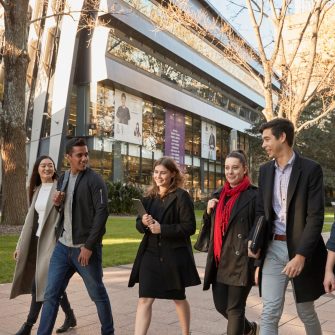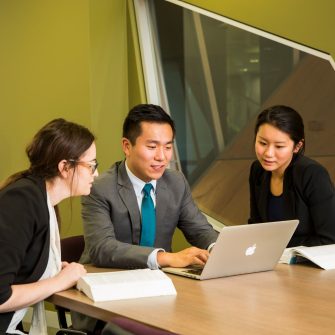Master of Laws
- Commencing Terms
- Term 1, 2 & 3
- Duration
- 1 Year(s)
- Delivery Mode
- Face-to-face (includes blended)
- Campus
-
Kensington
- Codes
- Program code 9201
- CRICOS code 000733G
-
2026 Indicative first year full fee
- $42,000*
-
2026 Indicative full fee to complete degree
- $42,000*
-
2026 Indicative first year full fee
- $59,000*
-
2026 Indicative full fee to complete degree
- $60,000*

Application closures for 2026
Undergraduate programs for 2026 intakes are closed for New Overseas Student Commencement (NOSC) applications. Applications for postgraduate programs remain open. Find out if this closure applies to you.
- Overview
- Entry requirements
- What will I study?
- Future careers
- How to apply
- Fees & Scholarships
Overview
The UNSW Master of Laws (LLM) is a one-year full-time postgraduate degree that offers you the opportunity to develop an advanced and contemporary understanding of one or more areas of legal study, acquire further expertise and enhance your career prospects.
In 2026, UNSW Law & Justice will offer the following specialisations that reflect our expertise and the latest developments in legal scholarship. Our LLM areas of specialisation include:
- Corporate & Commercial Law
- Criminal Justice & Criminology
- Human Rights Law & Policy
- International Law
- Technology, Intellectual Property & Media Law
Alternatively, you can complete a generalist program and benefit from choosing courses across our specialisations.
Please note this program is not a pathway to legal practice. Students looking for a postgraduate qualification enabling them to practice law should instead consider UNSW's Juris Doctor.
Key features
- Learn up-to-date knowledge and skills. We review our LLM program continuously to ensure the curriculum is tailored to meet the industry's evolving needs and offers the latest legal education innovations.
- Specialise in one of our eight specialisation areas or generalise to undertake a broad range of courses across our areas of expertise.
- Benefit from flexible course delivery, with a combination of intensive or weekly classes (including evenings) and a mix of online or in class, to suit various learning preferences and help you balance work and family commitments.
- Choose from a range of cross-disciplinary electives across UNSW’s faculties, including Business, Medicine, Science, Engineering and Arts, Design & Architecture.
- Learn from, network and engage with a diverse cohort of students and teachers with interdisciplinary perspectives in their fields.
Why study at UNSW?
World-class Scholarship
Learn from the minds at the forefront of research and industry knowledge at UNSW Law & Justice, ranked #1 in Australia and #12 globally for law and legal studies (QS World University Rankings by Subject, 2025). Access the highest teaching quality among Australia’s research-intensive law faculty within the Group of Eight (Go8) universities.
Exclusive Career Support
Graduate career-ready with UNSW Law & Justice’s in-house careers service, dedicated to our students and alumni. The service includes a jobs board and a range of resources, presentations and workshops to maximise your employability.
Engage with World-recognised Centres
UNSW Law & Justice is home to leading academics in our China International Business and Economic Law (CIBEL) Centre ; Centre for Crime, Law and Justice (CCLJ); Indigenous Law Centre; National Children and Youth Law Centre; Andrew & Renata Kaldor Centre for International Refugee Law; and The Allens Hub for Technology, Law & Innovation. Students have opportunities to undertake internships during their LLM program
Global Student Opportunities
Gain global perspectives by studying other countries’ legal systems through overseas electives we offer around the world.
Want to see more from UNSW Law and Justice?
Entry requirements
The UNSW LLM is open to law and non-law graduates. If you’re applying to the program with a non-law degree or with a law degree from a non-common law country, you’ll need to incorporate compulsory core courses into your program.
To be eligible for the Master of Laws (LLM) by Coursework, you must have achieved a credit average (WAM of 65% or higher, as determined by UNSW Postgraduate Admissions) in one of the following qualifications:
- A Bachelor of Laws (LLB) with Honours.
- A Bachelor of Laws (LLB) obtained through either a double degree program or a Bachelor of Laws (LLB) with a minimum 4-year duration.
- A postgraduate degree in law or a relevant cognate discipline.
- A bachelor's degree in a relevant cognate discipline and at least two years of documented relevant professional experience.
For the purposes of (4), relevant professional experience could include professional experience in legal and policy issues gained as an officer in local government; consulting on legal and policy issues; an officer/manager or similar for state or federal government agency with responsibility for legal and policy issues; corporate auditing, monitoring or managing legal and policy issues; project management with a legal or policy focus; NGO or international organisation responsible for law or policy reform.
Credit Transfer Policy
If you've completed postgraduate law courses at another tertiary institution or in another UNSW degree, you may be eligible for a credit transfer. Find out more in the Credit Transfer Rules and Regulations.
Cognate disciplines |
|
|
|
English language requirements
You may be asked to provide evidence of your English proficiency to study at UNSW depending on your educational background and citizenship. English language skills are vitally important for coping with lectures, tutorials, assignments and examinations - this is why UNSW requires a minimum English language competency for enrolment.
If you’re completing an Australian Year 12 qualification (e.g. NSW HSC or equivalent), you do not need to provide anything extra to prove your proficiency. Your qualification will be used as evidence of your English proficiency.
If you do need to provide evidence of your English proficiency, this will be indicated in your application. You can prove this by providing evidence that you meet one or more of the following criteria:
- English language tests and university English courses
- Prior study in the medium of English
- Other qualifications
If you need to improve your English skills before you start your degree, UNSW College’s Academic English Programs are for you. The programs are suitable for various English levels and help you prepare for university studies and life in Australia.
For more details, visit the English Language Requirements page.
The UNSW LLM is open to law and non-law graduates. If you’re applying to the program with a non-law degree or with a law degree from a non-common law country, you’ll need to incorporate compulsory core courses into your program.
To be eligible for the Master of Laws by Coursework, you must have any of the following:
- a Bachelor of Laws (LLB) (Honours) degree with a credit average from UNSW Sydney or a qualification considered equivalent from another university or tertiary institution.
- a Bachelor of Laws (LLB) degree with a credit average from UNSW Sydney or a qualification considered equivalent from another university or tertiary institution.
- a Juris Doctor degree with a credit average from UNSW Sydney or a qualification considered equivalent from another university or tertiary institution.
- a bachelor's degree in social sciences or humanities with a credit average, from UNSW Sydney or a qualification considered equivalent from another university or tertiary institution.
- a Juris Doctor degree or a bachelor's degree in laws, Social Sciences or Humanities from UNSW Sydney or a qualification considered equivalent from another university or tertiary institution with a minimum of two years of relevant professional experience;
- a bachelor's degree from UNSW Sydney with a credit average or a qualification considered equivalent from another university or tertiary institution and a minimum of two years of relevant professional experience.
For (5) and (6), relevant professional experience could include professional experience in legal and policy issues gained as an officer in local government; consulting on legal and policy issues; an officer/manager or similar for state or federal government agency with responsibility for legal and policy issues; corporate auditing, monitoring or managing legal and policy issues; project management with a legal or policy focus; NGO or international organisation responsible for law or policy reform.
Please note: Applicants from non-211 Chinese Universities interested in studying this program must achieve a minimum overall average of 80 in their current university’s grading system. This is equivalent to a 75% scaled average using the UNSW Postgraduate Coursework Entry Score Calculator.
Credit Transfer Policy
If you've completed postgraduate law courses at another tertiary institution or in another UNSW degree, you may be eligible for a credit transfer. Find out more in the Credit Transfer Rules and Regulations.
Cognate disciplines |
|
|
|
English language requirements
You may be asked to provide evidence of your English proficiency to study at UNSW depending on whether you are from an English-speaking background or non-English speaking background. English language skills are vitally important for coping with lectures, tutorials, assignments and examinations - this is why UNSW requires a minimum English language competency for enrolment.
If English is not your first language, you’ll need to provide proof of your English proficiency before you can be given an offer to study at UNSW. You can do this by providing evidence that you meet one or more of the following criteria:
- English language tests and university English courses
- Prior study in the medium of English
- Other qualifications
If you need to improve your English skills before you start your degree, UNSW College’s Academic English Programs are for you. The programs are suitable for various English levels and help you prepare for university studies and life in Australia.
For more details, visit the English Language Requirements page.
Check the specific English language requirements for this program
What will I study?
UNSW is introducing a new academic calendar from 2028.
We are moving to a new flex-semester calendar. What does this mean for your studies?
Program structure
You can complete the UNSW Master of Laws (LLM) in one year of full-time study or part-time across four or more terms. You’ll choose from eight specialisation areas or complete a generalist program and choose a combination of courses from any of our specialisations. To be awarded an LLM with a specialisation, you must complete at least four courses in your chosen field.
Students can also choose to study up to two elective courses from the Master of Science in Taxation (MSc Tax) at the University of Oxford, subject to faculty approval. For those students who have elected to study Corporate, Commercial and Taxation Law, these courses may contribute to this specialisation.
Full program structure
In this degree, you’ll study eight courses (48 units of credit), including the option to undertake:
- foundation courses, if required
- a specialisation made up of a four-course sequence or a generalist program
- cross-disciplinary electives from across UNSW’s faculties
If you choose to complete a specialisation (made up of a major sequence of four courses), you’ll receive the name of the specialisation in parentheses after 'Master of Laws' on your testamur.
Leading academics and industry professionals will teach your courses in various formats throughout the UNSW academic calendar's three terms. Some of your classes will run for three hours per week over a teaching term, while in others, courses may arrange the class hours more intensively to allow you to focus entirely on your research project. Courses are offered either online or involve in-person classes. Depending on what courses you choose, it may be possible to complete your LLM fully online.
To help you plan your timetable, you can view the 2025 postgraduate course offerings for the UNSW Master of Laws.
Future careers
You'll graduate with advanced, integrated and up-to-date legal knowledge that you can apply to a broad range of law and non-law career opportunities.
Law graduates will find this program appealing as it allows them to acquire a new field of legal knowledge for a career change, career advancement or professional development. For non-law graduates, the acquired legal knowledge and skills will help them understand how the law works in their industry.
How to apply
Applications must be submitted through our Apply Online portal. We encourage you to submit your completed application as early as possible to ensure it will be processed in time for your preferred term. Some high-demand programs and Faculties with limited places may have an earlier application deadline or commencement date. Find out more.
Ready to start your application?
For most international students, applications are submitted via our Apply Online service. We encourage you to submit your completed application as early as possible to ensure it will be processed in time for your preferred term.
This high-demand program is part of UNSW’s Grouped Offer Rounds. We assess and rank applicants who meet minimum entry requirements, then issue offers based on academic merit and program capacity within each round. UNSW uses a quota system to ensure optimal teaching and learning quality and reserves the right to adjust application and acceptance deadlines to maintain these quotas. For details, visit the international admissions information page.
Ready to start your application?
Fees & Scholarships
*Fees are subject to annual review (or when required) by the University and may vary accordingly.
Indicative fees are a guide only and have been calculated based on the typical enrolment patterns of students undertaking the program. The indicative fees listed here is an estimate for tuition only and excludes non-tuition fees and charges. The amount you pay will vary depending on the calendar year of enrolment, the courses you select and whether your study load is more or less than 1 Equivalent Full Time Student Load (48 units of credit (UOC) per year).
You should not rely on indicative fees as fee increases are assessed when required and may exceed the indicative figures listed here. Actual fees are calculated on enrolment. More information on fees can be found at the UNSW fees website.
*Fees are subject to annual review by the University and may increase annually, with the new fees effective from the start of each calendar year. The indicative fees listed here are based on an estimated average and are for tuition only, other fees and charges are not included. The amount you pay will vary depending on the calendar year to enrol, the courses you select and whether your study load is more or less than 1 Equivalent Full Time Student Load (8 courses per year).
Indicative fees are a guide for comparison only based on current conditions and available data. You should not rely on indicative fees. More information on fees can be found at the UNSW fees website.
Indicative fees to complete the program have been calculated based on a percentage increase for every year of the program. Fee increases are assessed annually and may exceed the indicative figures listed here.
Indicative fees to complete the program include tuition plus an estimate of study-related costs of approximately $1,000 per year. To find out more about other costs, visit UNSW International.
Scholarships
At UNSW, we award over $83 million in scholarships each year. We pride ourselves on rewarding excellence and making university accessible to students from all walks of life. Whether you’re a domestic or international student, our range of scholarships, prizes and awards can support your journey.
Featured scholarship
UNSW Scholarships for International Students Commencing Term 1, 2025
Designed to empower the brightest and most passionate international students to achieve their goals through their UNSW studies, this scholarshop opens for applications on the 1st of September 2024 and closes 30th of November 2024. There are a range of scholarships open to international students when you submit an application for the UNSW Scholarships for International Students Commencing Term 1, 2025 (PUCA1029). The value of these scholarships along with eligibility requirements varies, you can find out more on our Scholarships page.
Progress starts here – at a world-leading university

Top 20 Worldwide
Ranked in the global top 20 for three consecutive years
QS World University Rankings, 2024–2026

Winner of the AFR Most Employable University Award six years in a row
AFR Top100 Future Leaders Awards, 2020–2025

Australia's #1 for Innovation
Highest number of startups and spinouts from university-developed tech
SCOPR report, 2024





